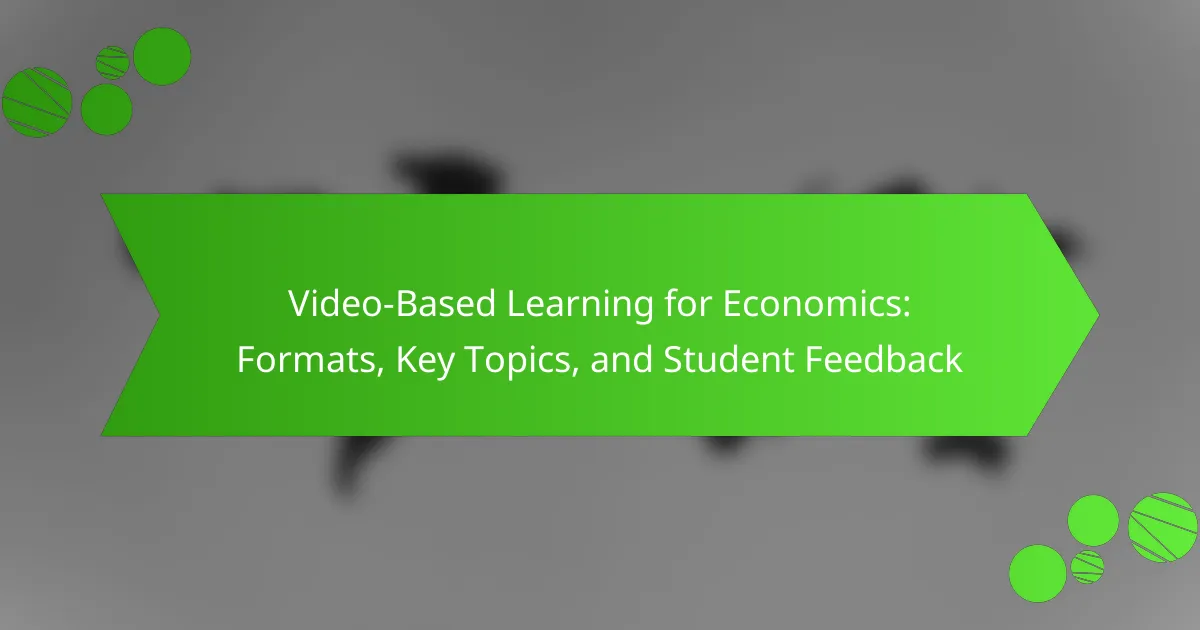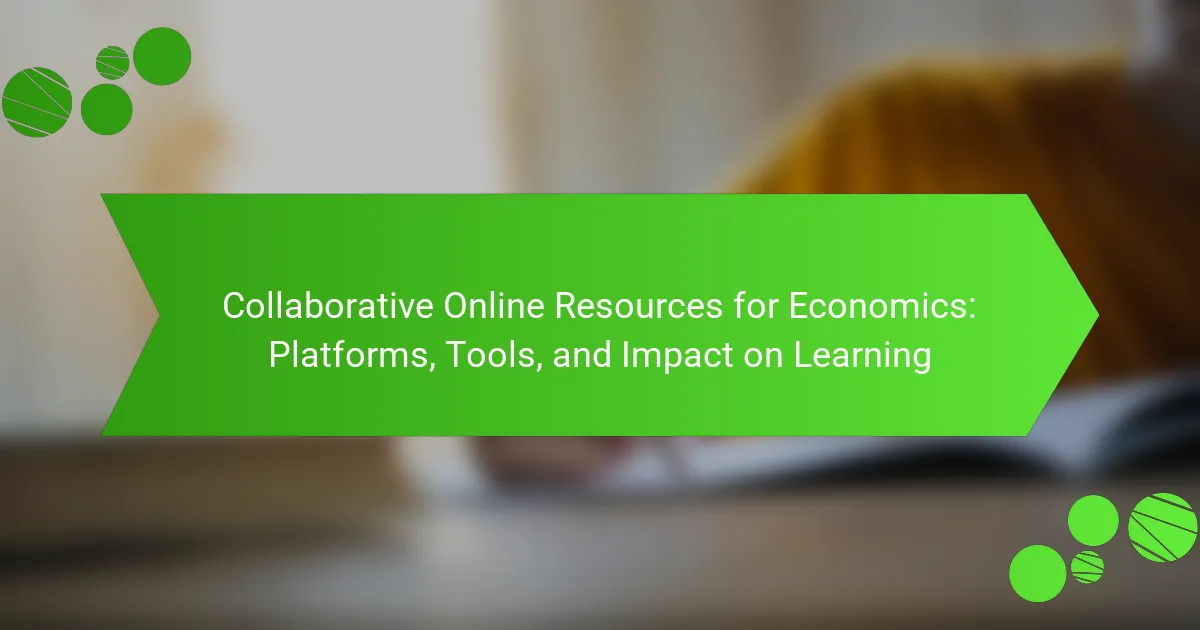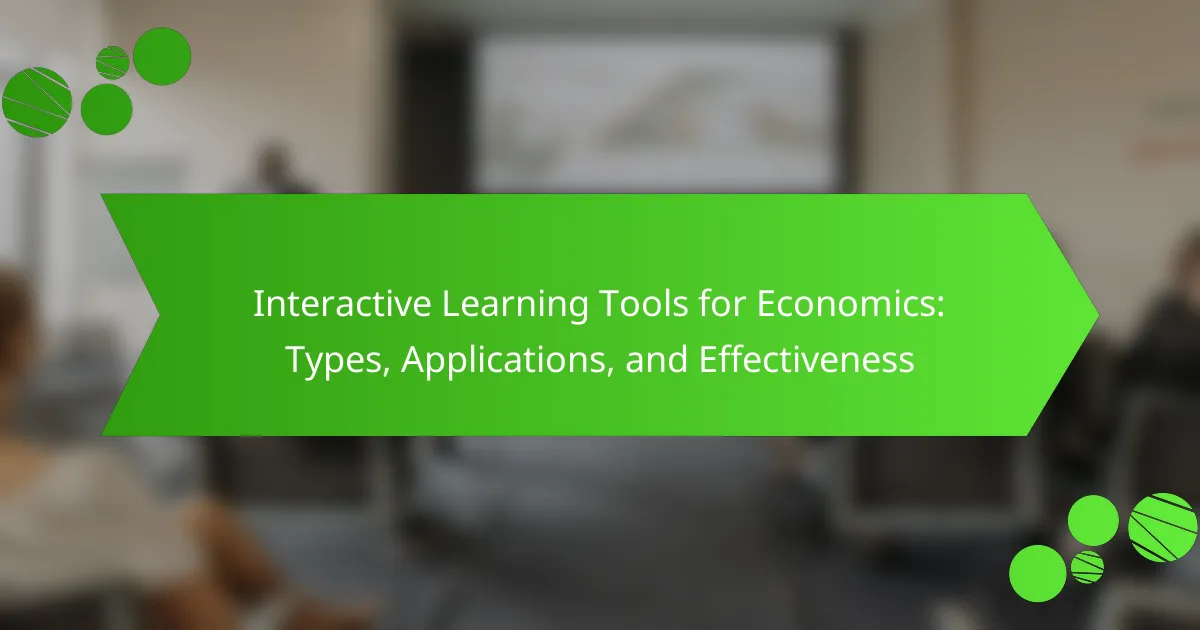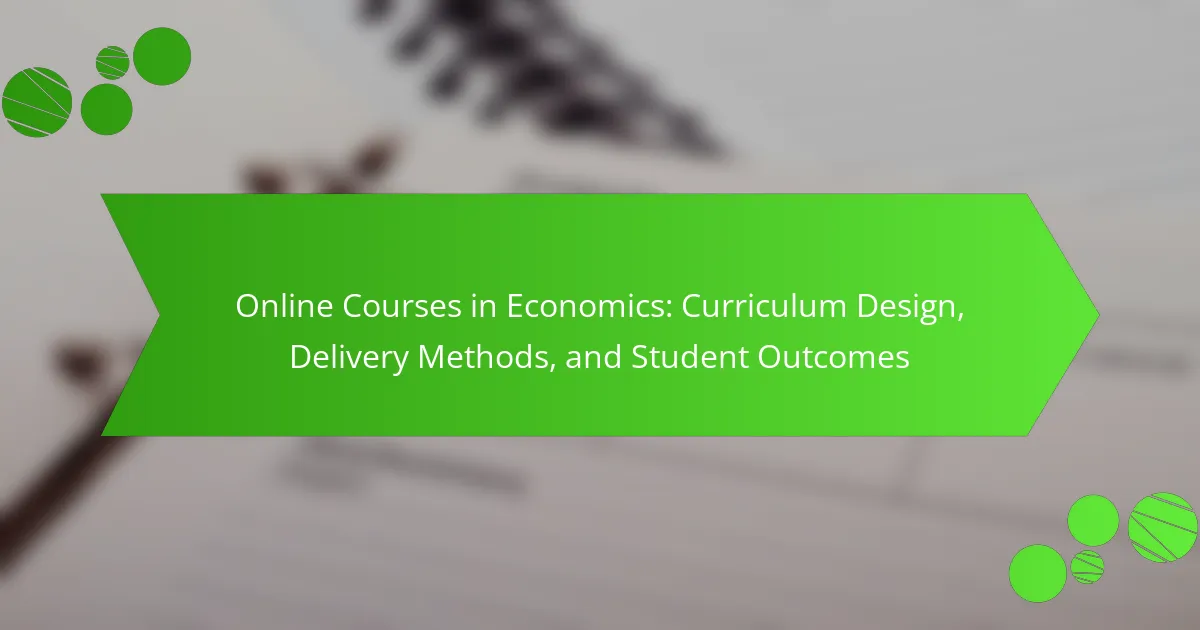Social media significantly enhances economics education by improving engagement and accessibility for students and educators. It serves as a platform for real-time discussions, resource sharing, and collaboration, allowing learners to access diverse materials such as articles, videos, and expert opinions. Research indicates that using social media in learning environments can lead to higher engagement levels and better understanding of complex economic theories. Various online learning platforms, including Coursera and Khan Academy, complement social media by offering structured courses, while platforms like Twitter and YouTube facilitate interactive discussions and visual content. Engagement strategies within these platforms promote active participation, leading to improved retention and academic performance in economics.
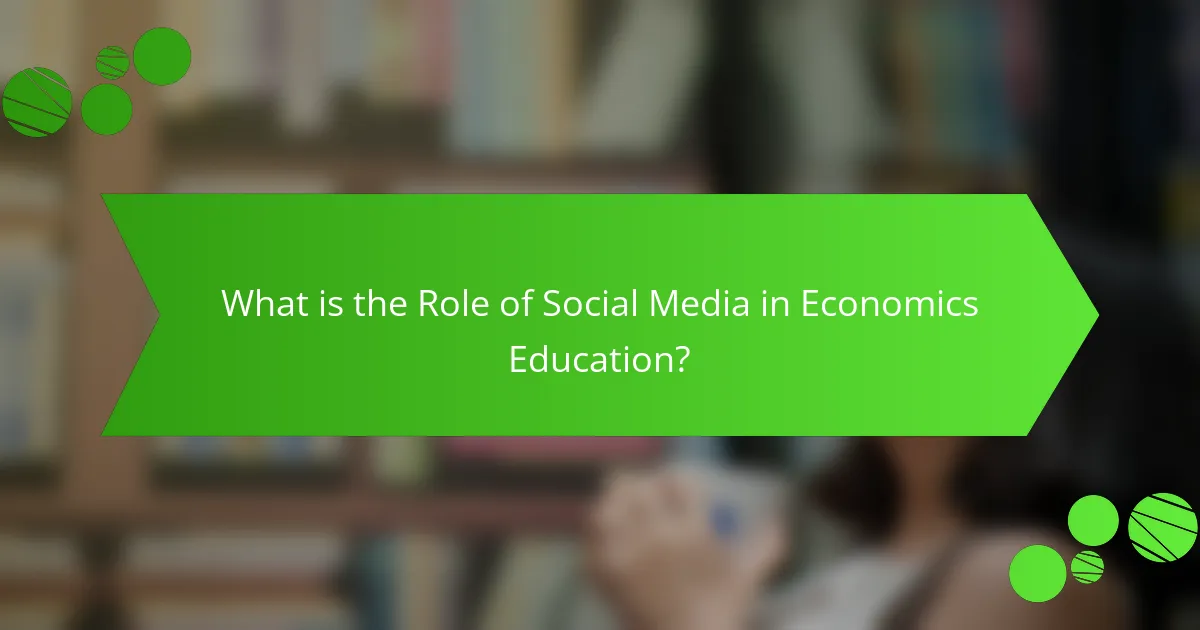
What is the Role of Social Media in Economics Education?
Social media plays a significant role in economics education by enhancing engagement and accessibility. It provides platforms for real-time discussions and sharing of economic concepts. Students can access diverse resources, including articles, videos, and expert opinions. Social media fosters collaboration among learners and educators. It encourages the exchange of ideas and peer-to-peer learning. Additionally, it allows educators to share updates on economic trends and events. Research indicates that social media can improve students’ understanding of complex economic theories. A study by the Journal of Economic Education shows that students using social media for learning report higher engagement levels.
How do social media platforms facilitate economics education?
Social media platforms facilitate economics education by providing accessible resources and interactive learning environments. They host educational content like articles, videos, and infographics that explain complex economic concepts. Platforms like Twitter and Facebook allow educators to share insights and engage with students directly. Users can participate in discussions, ask questions, and gain diverse perspectives on economic issues. Moreover, social media promotes collaborative learning through groups and forums dedicated to economics topics. Research indicates that students using social media for learning report increased engagement and understanding of economic principles. A study published in the “Journal of Economic Education” found that social media enhances student motivation and improves retention of information.
What are the key features of social media that enhance learning?
Key features of social media that enhance learning include interactivity, accessibility, and collaboration. Interactivity allows learners to engage with content through comments, likes, and shares. This engagement fosters a sense of community among learners. Accessibility enables learners to access educational resources anytime and anywhere. Research indicates that 90% of students use social media for educational purposes. Collaboration features, such as group discussions and shared resources, promote teamwork and knowledge sharing. These elements create a dynamic learning environment that supports diverse learning styles.
How does the accessibility of social media impact student engagement?
The accessibility of social media significantly enhances student engagement. Students can easily connect with peers and educators through these platforms. This connectivity fosters collaboration and discussion around academic topics. Research indicates that 70% of students feel more engaged when using social media for educational purposes. Platforms like Twitter and Facebook provide real-time feedback and support. Additionally, social media offers diverse content formats, catering to various learning styles. The interactive nature of these platforms encourages active participation in learning activities. Overall, increased accessibility leads to higher levels of student involvement and motivation.
Why is social media important for economics educators?
Social media is important for economics educators because it enhances engagement and facilitates communication. It allows educators to share resources and insights quickly. Platforms like Twitter and LinkedIn provide access to a global network of professionals. This connectivity fosters collaboration and knowledge exchange among educators. Social media also enables real-time discussions on current economic events. Research shows that interactive platforms improve student motivation and participation. A study by the Journal of Economic Education highlights increased student engagement through social media use. Overall, social media serves as a vital tool for enriching economics education.
How can educators utilize social media to improve teaching methods?
Educators can utilize social media to improve teaching methods by enhancing communication and collaboration. Social media platforms facilitate real-time interaction among students and teachers. This interaction fosters a sense of community and engagement. Educators can share resources, articles, and videos related to economics education. Research shows that students who engage with educational content on social media demonstrate improved understanding. For example, a study by Manca and Ranieri (2016) indicates that social media enhances collaborative learning. Additionally, educators can use social media for feedback on assignments and concepts. This immediate feedback loop can clarify misunderstandings quickly. Overall, social media serves as a dynamic tool for enriching the educational experience.
What opportunities does social media provide for professional development?
Social media provides various opportunities for professional development. It facilitates networking with industry professionals and peers. Platforms like LinkedIn allow users to connect and collaborate. Social media offers access to online courses and webinars. Many organizations share valuable resources through these channels. Users can follow thought leaders for insights and trends. Engaging in discussions enhances knowledge and skills. Furthermore, social media supports personal branding and visibility in one’s field. This multifaceted approach to learning fosters continuous professional growth.
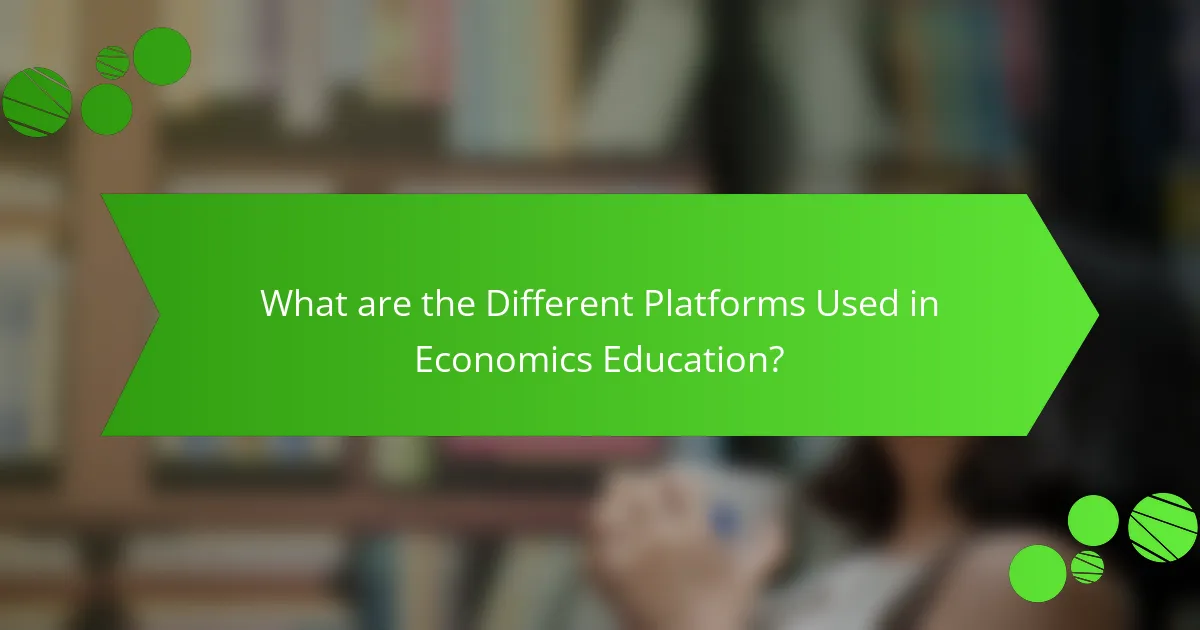
What are the Different Platforms Used in Economics Education?
Online learning platforms are commonly used in economics education. These platforms include Coursera, edX, and Khan Academy. They offer various courses and resources for students. Social media platforms also play a significant role. Twitter, LinkedIn, and Facebook are used for sharing information and engaging discussions. YouTube provides visual content that enhances understanding. Blogs and forums facilitate peer interaction and knowledge sharing. Each platform offers unique benefits for economics education.
Which social media platforms are most effective for teaching economics?
Twitter, Facebook, and YouTube are the most effective social media platforms for teaching economics. Twitter allows for quick sharing of economic insights and news updates. Facebook groups facilitate discussions and community building among students and educators. YouTube provides visual and engaging content through lectures and tutorials. Research indicates that these platforms enhance student engagement and accessibility to economic concepts. A study by the Journal of Economic Education found that social media improves learning outcomes when integrated into traditional teaching methods.
How do platforms like Twitter and Facebook compare in educational use?
Twitter is often used for quick information sharing, while Facebook allows for more in-depth discussions. Twitter’s character limit encourages brevity and immediacy, making it suitable for real-time updates and announcements. In contrast, Facebook’s longer post capabilities facilitate detailed explanations and community interactions.
Educational institutions have leveraged Twitter for announcements and event promotion. A study by the University of Massachusetts found that Twitter increases student engagement through its fast-paced nature. Facebook groups can foster collaborative learning environments, as reported in research by the Journal of Educational Technology & Society, which highlighted increased interaction among students in Facebook-based courses.
Both platforms serve different educational purposes, with Twitter excelling in quick communication and Facebook in community building.
What unique features do platforms like LinkedIn offer to economics educators?
LinkedIn offers unique features that enhance the experience of economics educators. The platform facilitates professional networking among educators and industry professionals. This networking can lead to collaboration opportunities and knowledge sharing. LinkedIn’s Groups feature allows educators to join discussions relevant to economics education. These groups provide a space for sharing resources and best practices. The platform also offers content publishing capabilities, enabling educators to share articles and insights. This can help in establishing thought leadership in the field of economics. Additionally, LinkedIn Learning provides access to courses that can supplement educators’ teaching materials. These features collectively support continuous professional development for economics educators.
What are the advantages and challenges of using social media platforms?
Social media platforms offer various advantages and challenges. Advantages include enhanced communication, increased engagement, and access to a broader audience. For instance, platforms like Twitter enable real-time interaction between educators and students. This immediacy fosters collaborative learning environments. Moreover, social media can provide diverse resources and perspectives, enriching educational content.
However, challenges exist as well. Issues like misinformation and distraction can hinder effective learning. A study by the Pew Research Center found that 64% of students encounter misleading information on social media. Privacy concerns also arise, as personal data may be exposed. Additionally, the digital divide can limit access for some students, exacerbating educational inequalities.
How can educators overcome challenges in using social media for teaching?
Educators can overcome challenges in using social media for teaching by establishing clear guidelines for usage. These guidelines help manage student interactions and content sharing. Training sessions can enhance educators’ understanding of social media tools. Familiarity with platforms improves their ability to integrate them effectively into lessons. Encouraging positive online behavior fosters a respectful learning environment. Regular feedback from students can identify issues early and improve strategies. Collaborating with colleagues allows for sharing best practices and resources. Utilizing analytics tools can help assess engagement and effectiveness of social media use in teaching.
What are the best practices for selecting the right platform for economics education?
The best practices for selecting the right platform for economics education include assessing the platform’s user engagement features. Look for platforms that facilitate interactive learning through discussion forums and quizzes. Evaluate the availability of resources such as videos, articles, and case studies. Ensure the platform supports diverse learning styles, including visual, auditory, and kinesthetic methods. Check for mobile accessibility to accommodate learners on the go. Review the platform’s reputation and user reviews to gauge effectiveness. Consider platforms that offer analytics to track student progress and engagement. Finally, ensure the platform aligns with curriculum standards and learning objectives.
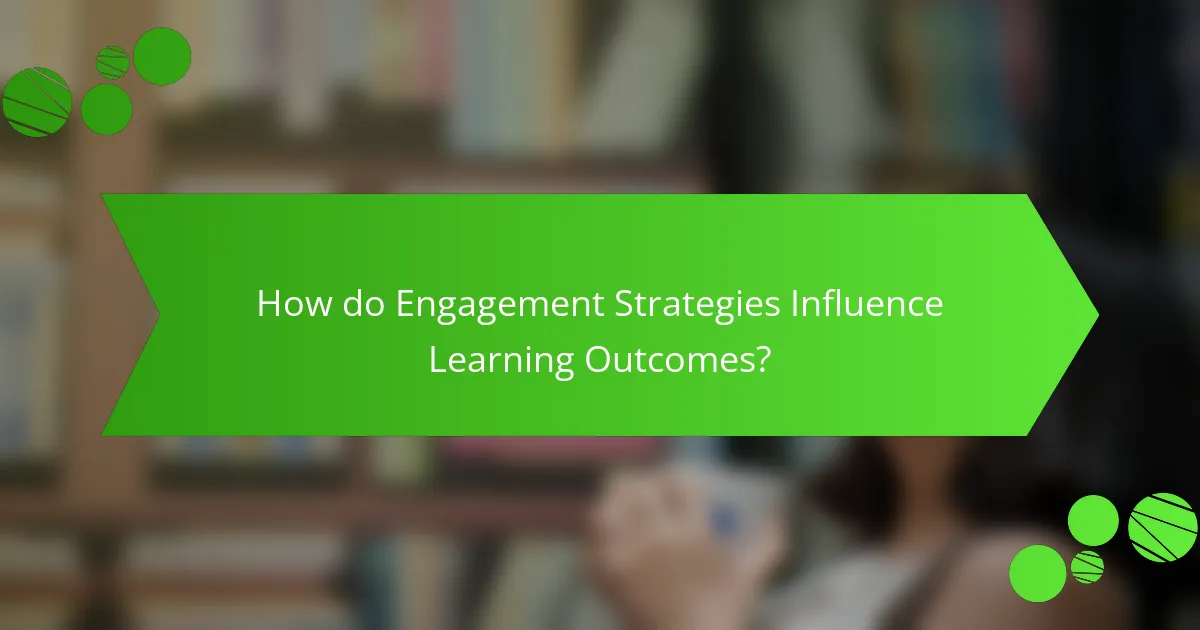
How do Engagement Strategies Influence Learning Outcomes?
Engagement strategies significantly enhance learning outcomes by fostering active participation. Active participation leads to improved retention of information. Students who engage with content are more likely to understand complex concepts. Research indicates that interactive elements, such as discussions and polls, increase engagement. A study by Freeman et al. (2014) found that active learning strategies can increase exam scores by up to 6%. Social media platforms facilitate collaboration and peer learning, further enhancing understanding. When students engage with their peers, they develop critical thinking skills. Overall, effective engagement strategies contribute to deeper learning and better academic performance.
What engagement strategies can be employed on social media?
Engagement strategies on social media include interactive content, polls, and live Q&A sessions. These strategies encourage audience participation and foster a sense of community. Using visuals such as infographics and videos can also enhance engagement. Regularly responding to comments and messages builds relationships with followers. Hosting contests or giveaways can attract new followers and maintain interest. Collaborating with influencers can extend reach and credibility. According to a study by Sprout Social, posts with images receive 650% higher engagement than text-only posts. These strategies effectively enhance user interaction and retention on social media platforms.
How can interactive content enhance student participation?
Interactive content enhances student participation by fostering engagement through dynamic learning experiences. It allows students to actively participate rather than passively consume information. Examples include quizzes, polls, and interactive videos that require student input. This involvement can lead to increased motivation and retention of knowledge. Research indicates that interactive content can improve learning outcomes by up to 60% compared to traditional methods. Students are more likely to engage when they can manipulate content and receive immediate feedback. Such interactive elements can also facilitate collaboration among peers, further enhancing participation.
What role do discussions and forums play in economics education on social media?
Discussions and forums on social media play a crucial role in economics education. They facilitate peer-to-peer learning among students and enthusiasts. Participants can share insights, ask questions, and clarify concepts in real-time. This interactive environment enhances understanding of complex economic theories. Research indicates that collaborative learning improves retention of information. For instance, a study by the University of California found that students engaged in online discussions scored higher on assessments. Forums also provide access to diverse perspectives, enriching the educational experience. Overall, these platforms foster a community-driven approach to learning economics.
How does student engagement on social media affect learning outcomes?
Student engagement on social media positively affects learning outcomes. Engaged students demonstrate higher levels of motivation and participation in their studies. Social media platforms facilitate collaboration and communication among peers. This interaction promotes knowledge sharing and enhances understanding of complex concepts. Research indicates that students who engage on social media often report improved academic performance. A study by Junco (2012) found that students who use social media for educational purposes had higher GPAs. Additionally, social media can provide access to diverse resources and perspectives. This exposure enriches the learning experience and encourages critical thinking. Overall, active engagement on social media can lead to improved academic success and a deeper understanding of course material.
What evidence supports the impact of social media engagement on academic performance?
Social media engagement positively impacts academic performance. Research indicates that students who actively participate on platforms like Facebook and Twitter tend to achieve higher grades. A study by Junco (2012) found that students who used social media for educational purposes reported better academic performance. Another study by Pasek et al. (2009) showed that social media use was linked to increased academic motivation. Additionally, a survey by the Pew Research Center revealed that 70% of educators believe social media enhances student learning. These findings collectively support the notion that social media engagement can facilitate improved academic outcomes.
How can feedback and assessment be effectively managed through social media?
Feedback and assessment can be effectively managed through social media by utilizing structured communication channels. Platforms like Twitter and Facebook allow educators to collect real-time feedback from students. Surveys and polls can be integrated into posts to gauge understanding and gather opinions. Regular check-ins can be conducted through live sessions or Q&A formats to clarify concepts.
Educators can create dedicated groups for discussions, fostering a collaborative learning environment. This approach encourages peer feedback and enhances engagement. Analytics tools on these platforms can track participation and sentiment, providing insights into student performance.
Research indicates that 70% of students prefer receiving feedback through digital platforms, highlighting the importance of adapting to their preferences. Effective management of feedback and assessment through social media can lead to improved learning outcomes and student satisfaction.
What are practical tips for using social media in economics education?
Utilizing social media in economics education can enhance learning engagement. Educators should create dedicated social media groups for discussions. These groups can foster interaction among students and encourage collaborative learning. Sharing relevant articles and resources on these platforms keeps students informed about current economic trends. Incorporating multimedia content, such as videos and infographics, can make complex concepts more accessible. Hosting live Q&A sessions on social media allows for real-time interaction and clarification of doubts. Encouraging students to share their insights on social media promotes critical thinking. Finally, using polls and surveys can gauge student understanding and adapt teaching methods accordingly.
How can educators create an effective social media presence for their courses?
Educators can create an effective social media presence for their courses by selecting the right platforms. Popular platforms such as Twitter, Facebook, and Instagram can enhance course visibility. They should establish a consistent posting schedule to engage students regularly. Sharing relevant content, such as articles and videos, can stimulate discussion. Educators can use hashtags to increase the reach of their posts. Engaging with students through comments and direct messages fosters a sense of community. Additionally, they can create dedicated groups for course discussions. Research indicates that active social media engagement can improve student participation and learning outcomes.
What are common pitfalls to avoid when integrating social media into economics education?
Common pitfalls to avoid when integrating social media into economics education include lack of clear objectives. Educators should define specific goals for using social media. Without these goals, efforts may become unfocused and ineffective. Another pitfall is neglecting the importance of digital literacy. Students must be equipped to critically evaluate information online. Failing to address this can lead to misinformation. Additionally, over-reliance on social media can detract from traditional teaching methods. A balanced approach is crucial for effective learning. Inadequate engagement with students is also a concern. Active participation enhances learning outcomes. Lastly, privacy issues must be managed carefully. Educators should ensure that students’ personal information is protected.
The main entity of the article is the role of social media in economics education. The article provides a comprehensive overview of how social media enhances engagement and accessibility in economics learning, discussing various platforms such as Twitter, Facebook, and LinkedIn. It outlines key features that facilitate interactive learning, the impact of accessibility on student engagement, and effective engagement strategies that improve learning outcomes. Additionally, the article addresses challenges educators face when integrating social media and offers practical tips for optimizing its use in economics education.
